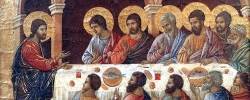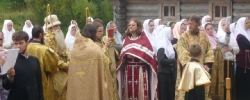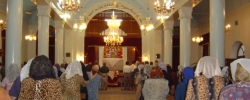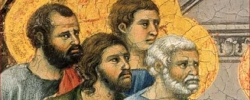In libreria

Fausto Ferrari
Religioso Marista
Area Formazione ed Area Ecumene; Rubriche Dialoghi, Conoscere l'Ebraismo, Schegge, Input
L’uomo vecchio che lotta contro l’uomo nuovo (Matta El Meskin)
Dio ha deposto in noi, con la fede e il battesimo, questo nuovo corpo dotato di capacità spirituali nuove e superiori, per neutralizzare l’influenza e l’arroganza dell’uomo vecchio in noi, non tanto dal punto di vista di ciò che percepiamo o sentiamo, quanto dal punto di vista di Dio, della sua immensa giustizia e della sua grande misericordia.
Una teologia declinata al futuro. A Dakar per un'agenda planetaria in prospettiva liberatrice (Claudia Fanti)
Un’agenda planetaria per la teologia – quella, si intende, liberatrice, contestuale, impegnata a lavorare per “un altro mondo possibile” – almeno per i prossimi due anni, fino cioè al prossimo Forum Mondiale di Teologia e Liberazione...
XXXII. Chiese ortodosse di stato irregolare. I Vecchi Credenti
Lo stato canonico di ciascuna delle Chiese che andremo a presentare è contestato in diversi modi dalla Chiesa Ortodossa. Ciò non significa che esse vadano tutte considerate allo stesso livello: infatti alcune sono ritenute semplicemente non canoniche, altre scismatiche e fuori dalla comunione della Chiesa Ortodossa.
L’intruso dentro di noi (Salvatore Passari)
L’intruso è però anche una dolorosa metafora dell’esistenza, che coniuga insieme dolore e fragilità, vita e morte, e che rilancia domande, antiche come le montagne, che non perdono il fascino e la drammaticità di sostare sull’interrogazione e che attivano un movimento di ricerca senza fine.
L’incontro con l'intruso. Pagine bibliche (Rosanna Virgili)
Infrange gli equilibri, apre il cerchio. Ti spinge sull’orlo del cortile, ti sbatte sulla strada, ti fa sporgere sul pericolo, ti spintona sull’ignoto. Scoordina le leggi della fisica, con la sua intrusione di corpo estraneo. Pensi di morire, se lo fai accomodare; ti terrorizza che prenda piede.
L’Anafora degli apostoli Addai e Mari
La validità di questa anafora non è mai stata ufficialmente confutata, né nell'Oriente né nell'Occidente cristiani. Le parole dell'Istituzione Eucaristica sono di fatto presenti nell'Anafora di Addai e Mari, non in modo narrativo coerente ed alla lettera, ma in modo eucologico e disseminato, vale a dire che esse sono integrate in preghiere successive di rendimento di grazie, lode e intercessione.
La parole qui féconde et renouvelle (Madeleine Delbrêl)
La phrase du Seigneur que nous avons arrachée à l’Evangile dans une messe du matin ou dans une course de métro, ou entre deux travaux de ménage, ou le soir dans notre lit, elle ne doit plus nous quitter, pas plus que ne nous quitte notre vie ou notre esprit.
La Esperanza (Frei Betto)
Jesús estuvo aquí tres veces, en la persona de la mujer embarazada, en la persona del camionero y en el niño hambriento. Pero usted no fue capaz de reconocerlo y de acogerlo...
Il Gesù ebreo e il Gesù dei vangeli (Rinaldo Fabris)
Da 200 anni si discute sulla contrapposizione tra il Gesù storico e il Cristo dei racconti evangelici. Di qui le grandi fasi della ricerca esegetico-storica: i vari metodi vanno usati in modo complementare e convergente.
Il pane, segno d'unità (Vladimir Zelinskij)
Non ci si può riconciliare sopprimendo lo sviluppo delle altre Chiese, ma ci si può riconoscere anche nella diversità della vita ecclesiale, nello spezzare il pane comune, affinché questo pane diventi di nuovo il segno dell’unità fra gli uomini e degli uomini con Cristo.










